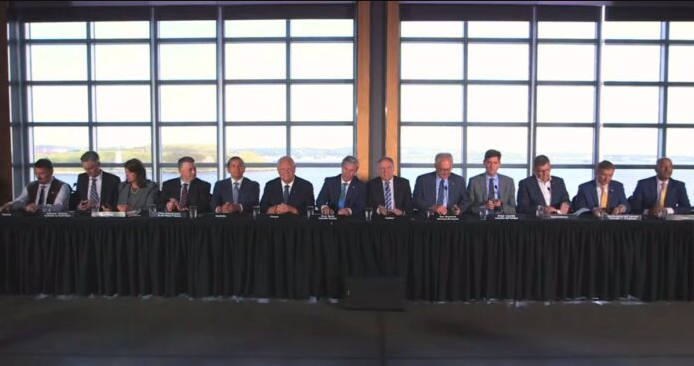
The Premiers’ meeting in Halifax looked like a fight about money and control. It was actually an attempt to save federalism in Canada.
The latest premiers’ meeting looked different. Instead of begging for handouts, they talked (briefly) about refusing federal handouts. Does this signal real change?
Note: this piece was published with True North.
Premiers expressed intense frustration last week over the lack of federal support and partnership on healthcare. The premiers’ Council of the Federation met for three days in Halifax, and as usual, healthcare topped their list of priorities.
The frustration falls only four months after Quebec signed its own side-deal with the federal government – the last province to settle details from last year’s $196.1 billion healthcare-funding agreement.
Since the Council formed in 2003, meetings have centred on money and control. Provinces want more federal money and less federal control. The federal government wants more control, while continuing to pay the provinces as little as possible.
This year, discussions seem to have gone beyond funding to address the deeper causes of frustration.
Alberta Premier Danielle Smith called attention to provinces rejecting federal funding aimed at boutique programming. Smith said provinces end up funding the “lion’s share” of operational costs.
Historically, the provinces have grumbled at federal funding offers – bribes designed to build programs the provinces could not afford to build on their own. Grumbling aside, provinces usually accept federal cash and do so willingly, with one notable exception. The final pillar of medicare, the Medical Care Act (1966), came with an offer to fund 50 per cent of medical services funded by a new federal ‘social development’ tax. Taxes would increase whether or not provinces accepted the new funding. Ontario Premier John Robarts called it, “The greatest machiavellian fraud ever perpetrated on the people of Canada.”
The current group of Premiers have taken a different tack. They reject federal bribery cloaked in the constitutionally questionable use of federal spending power. The provinces can neuter federal power, if they stick together. The federal government knows this, which might explain the use of “side deals” in the 2023 federal-provincial funding agreement mentioned above.
In fairness, not all funding is bribery. It hinges on how it is structured.
Premier Tim Houston, Chair of the Council, sent a letter to Justin Trudeau on behalf of the premiers. In it, he calls for “true partnership to revitalize cooperative federalism in Canada.”
True partnership, according to Peter Block, organization development expert, includes four things: an exchange of purpose, the right to say no, joint accountability, and absolute honesty. This means provincial and federal leaders should meet and build a shared purpose, before planning any new program. Each party should have the right to stop plans at any time. Joint accountability would mean neither federal nor provincial governments could blame the other for poor performance. And neither side would conceal information about resources or true intentions.
True partnership captures the essence of what federalism was meant to be in Canada. Federalism was never a rigid protocol to delineate absolute rights between one level of government and another. Canadian federalism offers a place to start negotiating. It sets the table and gives everyone a voice.
Federalism is meant to be the basis of our ability to work together as a unified nation, not as a power play to force governments to do what they never wanted to otherwise.
Yuval Levin, Director of AEI, makes this same point about the American Constitution in his new book, American Covenant: How the constitution unified our nation – and could again. Negotiation frustrates political idealists. The constitution exists to facilitate peace and cooperation given a plurality of interests. Though different than American republicanism, Canadian federalism serves the same purpose – peace and compromise, not power and force exerted by one government on another.
The Premiers’ call for “true partnership to revitalize cooperative federalism in Canada” will require compromise by all. We cannot tolerate one level of government wielding anything against the other, be it ‘spending power’ or power of any other kind. Governments must embrace true partnership, or Canadian federalism becomes a charade.
The premiers have taken the high ground and asked for change. Will Justin Trudeau listen?

Other provinces just are not good partners.